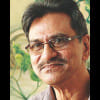
Kaiser Haq
Kaiser Haq is a Bangladeshi poet, translator, essayist, critic and academic.
Kaiser Haq is a Bangladeshi poet, translator, essayist, critic and academic.
Shahid Alam and I go back a long way, though we had both half-forgotten it until recently. He was two years senior to me at St. Gregory’s High School.
The book as a whole is a rigorously pursued exercise in the close reading of a fascinating and diverse array of modern texts that aren't quite in the category of the canonical mainstream.
Bangladeshi poetry has always been sensitive to socio-political issues and public themes. In discussing the poetic response to the Liberation War, therefore, it is useful to start with the broad historical background, move on to the literary tradition, and then consider the poetry itself.
The centenary of the Father of the Nation, and following on its heels the golden jubilee of the country’s independence, have precipitated a tireless round of celebratory events and an avalanche of varied publications.
For a couple of months after the 1970 elections everything seemed simple and straightforward.
I find two distinct types among denizens of the world of letters. There are writers single-mindedly focused on literary production in one genre or more, and others I would call, for want of a better term, literary personalities.
I had decided to write a brief review of Selima Chowdhury’s book when it was first published, but what with one thing or another making me put it off, a couple of years rolled by, and we found ourselves caught up in a pandemic with no end in sight.
Amitav Ghosh’s passionate engagement with the Sundarbans has brought out his best as a socially conscious fashioner of narrative in The Hungry Tide (HarperCollins, 2004) and Gun Island (John Murray, 2019); enriched his intervention in the discourse on ecology, The Great Derangement: Climate Change and the Unthinkable (Penguin, 2016); and perhaps most felicitously, has brought to light the poet hiding behind his voluminous prose.
I have already spent the biblically allotted three score years and ten on this planet, and of these, roughly two-thirds have been associated with Dhaka University, first as a student and then as an academic.
the postman plods his weary way eternal bag slung over shoulder comes up to me at the unearthly hour when evening azan brings dusk tumbling down like playful children somersaulting
Ms Banalata Sen is mentioned thrice, at the end of each 6-line stanza, and each time the effect, in the context of the stanza’s affective and ideational development, is climactic.
The process of reading is consummated in rereading. It is sure to deepen and broaden our understanding of the work and its author, and quite possibly of ourselves as well.
I am sure it was sometime in 1965 that a classmate at St. Gregory’s, Muhammad Ali Rumee, piqued my curiosity by describing a new movement in letters launched by some friends of his elder brother.
Thanks to Google I have, at a click of the mouse, discovered that in our time around 165 members of the literary professions have
Just a few months into the war of liberation it became clear that the guerrilla operations would eventually have to be accompanied by warfare conducted by troops organised in regular units.
VS Naipaul, to use his most common appellation, died at his London home on August 11, six days short of his 86th birthday.
This is no doubt one of the most enjoyable stories in Anderson's collection – brief, uncomplicated, hilarious. It's only recently that I began to have doubts about its purported significance. Let us begin by reminding ourselves of the salient features of the tale.